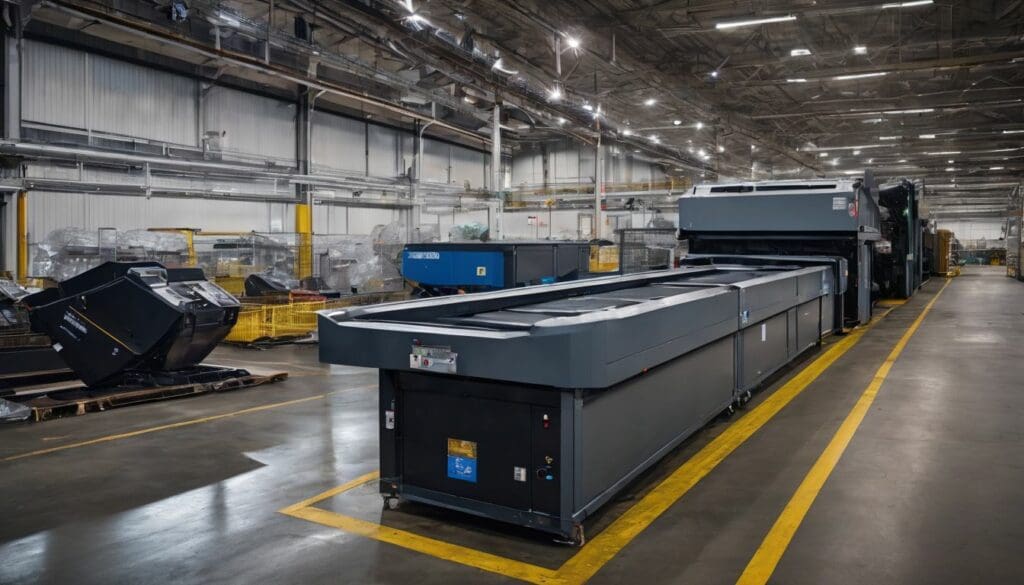Recycling has encountered a bottleneck; we’re all pitching in, eager to do our part, but alas, the system appears quite inundated. Like yourself, we’ve witnessed recycling containers chock-full of items steeped in uncertainty – astonishingly, it turns out that 32% of American sorting facilities are now adopting robot helpers! We’ve delved into the intriguing realm of waste management breakthroughs to bring to light how AI and cutting-edge tech are revolutionising the way we recycle.
Continue reading and join us as we explore a more sustainable future where sorting through recyclables becomes less of an ordeal and more of a seamless process.
Key Takeaways
- Advanced sorting technologies, including AI and robotics, are improving recycling processes by increasing the speed and accuracy of sorting recyclable materials.
- With 32% of US recycling centres now using robotics to sort waste, there’s been a notable shift towards technology-driven sustainability in waste management.
- Artificial intelligence is not only speeding up the separation of items but also predicting market trends for better supply chain optimisation.
- The integration of AI in recycling results in less contamination and higher quality recycled products, reducing the amount that ends up in landfills.
- As new types of packaging enter the market, adapting these advanced technologies will be crucial for effective recycling.
Overview of Current Recycling Processes
Current recycling processes are faced with challenges and operational inefficiencies, making it difficult to achieve efficient material recovery. As a result, the integration of advanced sorting technologies like artificial intelligence and robotics has become crucial in revolutionising the recycling industry.
Challenges faced
Recycling technology has come a long way, but it still faces significant challenges. Overcoming these obstacles is crucial for achieving environmental sustainability and advancing the recycling industry.
- Inconsistent Material Quality: The materials that arrive at recycling centers often vary greatly in quality, making it difficult to sort and recycle them effectively. This inconsistency can lead to higher levels of contamination in recycled products.
- Sorting Complexities: Different materials require different recycling processes. Without advanced sorting technologies, it’s challenging to separate materials accurately, leading to lower recycling rates.
- Contamination Levels: Non-recyclable items mixed with recyclables contaminate the stream, making the process more complicated and reducing the value of end-products. Ensuring purity is a constant struggle.
- Dependence on Manual Labour: Traditional recycling relies heavily on manual sorting, which is slow and labour-intensive. Workers must quickly identify and sort a vast array of materials, which can be inefficient and unreliable.
- Limited Market for Recyclables: Economic factors influence the demand for certain recycled materials. Sometimes there isn’t a viable market for specific types, which discourages efficient recycling efforts.
- Rising Operational Costs: Operating a recycling facility is expensive due to equipment, energy, and labour costs. Cost-effectiveness becomes a key concern as prices continue to soar.
- Adapting to New Materials: As new types of packaging and products enter the market, recycling systems must adapt rapidly. These changes pose challenges for existing machinery and procedures.
Operational inefficiencies
Operational inefficiencies in recycling processes can lead to slow sorting and increased contamination, affecting the quality of recycled materials. Traditional methods often rely on manual intervention, leading to human error and a slower pace of sorting.
This results in reduced overall efficiency and higher costs for recycling facilities. With advanced sorting technologies powered by AI, like enhanced optical sorting and robotic systems, these inefficiencies are being addressed.
Robotics and artificial intelligence enable faster and more accurate sorting of recyclables, improving the overall operational efficiency of recycling centres.
AI technology is revolutionising the industry by streamlining the process with its ability to predict market trends accurately while optimising supply chains for improved sustainability goals.
The Integration of Advanced Sorting Technologies
Advanced sorting technologies, such as artificial intelligence and robotics, are revolutionising the recycling industry by streamlining the process of sorting and separating materials.
These cutting-edge systems are capable of identifying and categorising various types of waste with unprecedented precision and speed.
Artificial intelligence
Artificial intelligence (AI) revolutionises recycling through robotic sorting and precise material placement. With AI technology, sorting centres can process materials as granular as specific plastics at a quick pace.
This enables a significant improvement in the accuracy and efficiency of the recycling process, contributing to higher-quality recycled materials. Additionally, AI-powered recycling predicts market trends and optimises supply chains for advanced recycling, advancing sustainability goals.
Machine learning algorithms power AI-enabled robotics to streamline waste management operations. These advancements are essential for meeting recycling targets and minimising contamination levels.
Robotics
Robotic sorting technology used in recycling, such as AMP’s AI-powered machines, can accurately identify and separate specific materials at an impressive speed. By implementing robotics in the recycling process, it is now possible to sort materials as granular as a type of plastic with precision.
In the U.K., over 32% of sorting centres have adopted robotics for their operations, marking a significant increase from less than 5% in 2019. As a result, the integration of robotic sorting has revolutionised recycling efficiency and plays a key role in meeting sustainability objectives.
Robotic systems are indispensable for improving the accuracy and pace of material sorting processes within recycling facilities. With this innovative technology, automated separation guarantees higher-quality recycled materials while reducing contamination levels.
Advancements in AI-Powered Recycling
Advancements in AI-powered recycling have led to faster and more accurate sorting of recyclable materials, as well as the precise placement of materials for processing. With the integration of artificial intelligence and robotics, recycling operations are becoming more efficient and effective in reducing waste and providing environmental benefits.
Faster and more accurate sorting
Recycling facilities now benefit from faster and more accurate sorting, thanks to the integration of advanced technologies like robotics and artificial intelligence (AI). With AI-powered systems in place, robots can swiftly sort materials with remarkable precision, down to specific types of plastic at a pick.
This enhances efficiency by reducing processing times and minimising errors during sorting. As a result, recycling centres are better equipped to handle larger volumes of recyclable materials while ensuring the highest quality output.
Advanced sorting technologies revolutionise the recycling industry by significantly improving accuracy and speed in material separation. The implementation of AI not only enhances the overall efficiency but also plays a vital role in meeting sustainability goals.
Precise placement of materials
Advanced sorting technologies, powered by artificial intelligence (AI), have revolutionised the recycling industry. With AI-powered recycling, materials are sorted with pinpoint accuracy to ensure proper placement and diversion.
This precise sorting process is crucial for meeting sustainability goals and enhancing the quality of recycled materials. By leveraging AI technology, recycling centres can optimise their operations and reduce waste more effectively than ever before.
The implementation of advanced sorting technologies has reshaped the landscape of recycling by enabling the precise placement of materials, ultimately contributing to a more sustainable future for our planet.
Impact on Recycling Operations
The integration of advanced sorting technologies, particularly artificial intelligence, has resulted in increased efficiency and reduced waste in recycling operations. This has not only led to cost savings but also significant environmental benefits.
Increased efficiency
Artificial intelligence (AI) and advanced sorting technologies have significantly improved the efficiency of recycling operations. With AI-powered robotic sorting, materials are separated with greater accuracy and speed than traditional methods.
This not only reduces processing time but also minimises contamination, leading to higher-quality recycled materials that can be reintroduced into new products. Additionally, AI technology enables the prediction of market trends and optimisation of supply chains, contributing to a more efficient and sustainable recycling process.
The implementation of artificial intelligence in recycling marks a crucial advancement towards achieving faster and more accurate sorting processes, ultimately shaping the future of recycling.
Looking ahead, further innovations in AI-powered recycling will continue to enhance efficiency while meeting sustainability goals and driving environmental benefits.
Reduced waste
Moving towards reduced waste, AI-powered recycling plays a pivotal role in minimising the amount of materials that end up in landfills. With advanced sorting technologies, such as robotics and computer vision, AI can accurately identify and separate different types of materials at lightning speed.
This precise sorting ensures that recyclable items are diverted from general waste streams, leading to a significant reduction in overall waste generation.
The implementation of AI in recycling not only enhances the efficiency of sorting processes but also contributes to a substantial decrease in the volume of unrecyclable materials. By leveraging artificial intelligence and advanced sorting systems, recycling facilities can achieve higher purity levels in recycled materials while effectively diverting them from landfills.
Environmental benefits
Reduced waste is just one of the many environmental benefits that advanced sorting technologies bring to recycling. AI-powered recycling enables more precise placement of materials, ensuring that items are diverted to the correct streams and minimising contamination in the process.
With increased efficiency and higher-quality recycled materials, the implementation of these innovative solutions significantly contributes to reducing energy consumption and greenhouse gas emissions associated with traditional recycling processes.
The integration of advanced sorting technologies has a direct positive impact on environmental sustainability by improving recycling rates, lessening reliance on raw materials, and promoting a circular economy.
Future Directions and Challenges
The future of recycling will continue to be shaped by advancements in artificial intelligence and advanced sorting technologies. As waste streams evolve, the challenge will be to adapt these technologies to effectively sort and process new materials efficiently.
Further advancements
Advanced sorting technologies are evolving rapidly to meet the increasing demands of the recycling industry. AI-powered systems now boast enhanced capabilities, such as precise material placement and diversion, thanks to computer vision technology.
These advancements are crucial in meeting sustainability goals and improving recycling rates by ensuring higher-quality recycled materials. The use of robotics for granular material sorting has led to a significant increase in efficiency across sorting centres in the U.K.
The integration of innovative solutions, like enhanced optical sorting enabled by AI, is revolutionising waste management practices and streamlining supply chains. As we look towards the future, these technological advancements will continue to shape the landscape of recycling operations and pave the way for more sustainable practices.
Adapting to changing waste streams
Further advancements in recycling technologies are essential for adapting to changing waste streams. As the composition of waste evolves with emerging materials and consumer habits, advanced sorting systems must also evolve to efficiently handle these changes.
AI-powered recycling allows for precise material separation, ensuring that new and diverse waste streams can be effectively processed. By leveraging computer vision and machine learning, sorting facilities can stay agile and responsive to the evolving landscape of recyclable materials.
The integration of smart technology and automated sorting not only supports sustainability goals but also positions the recycling industry to meet future challenges posed by shifting waste streams.
Conclusion
The future of recycling is being shaped by artificial intelligence and advanced sorting technologies. AI-powered recycling enables precise material sorting, reducing waste and increasing efficiency.
These innovations are essential for meeting sustainability goals and improving the accuracy of recycling processes. The industry is set to further advance with the integration of AI, revolutionising waste management practices.
FAQs
1. What role does artificial intelligence play in the future of recycling?
Artificial intelligence, especially through AI-powered recycling systems, helps to sort recyclable materials more accurately and efficiently.
2. How does computer vision improve waste management?
Computer vision technology identifies and sorts different types of waste on a conveyor belt, making recycling processes faster and reducing contamination.
3. Can advanced sorting technologies make recycling more sustainable?
Yes, by utilising advanced sorting technologies and AI-powered innovations, we can enhance the sustainability of our waste management systems.
4. Are there new developments in AI for waste management?
There are many cutting-edge advancements happening now that use AI and machine learning to revolutionise how we manage and recycle waste.





